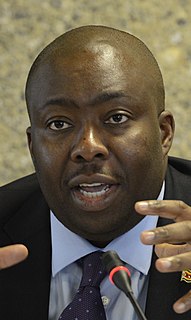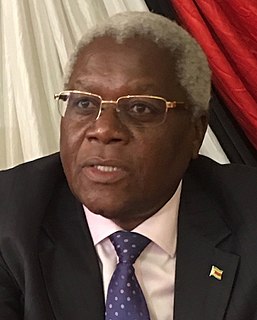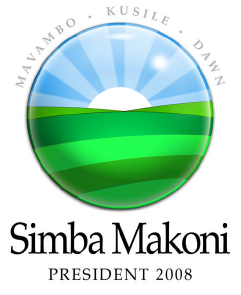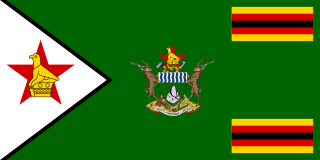Related Research Articles

The Zimbabwe African National Union – Patriotic Front (ZANU–PF) is a political organisation which has been the ruling party of Zimbabwe since independence in 1980. The party was led for many years under Robert Mugabe, first as Prime Minister with the Zimbabwe African National Union (ZANU) and then as President from 1987 after the merger with the Zimbabwe African People's Union (ZAPU) and retaining the name ZANU–PF, until 2017, when he was removed as leader.
Jonathan Nathaniel Mlevu Moyo is a Zimbabwean politician who served in the government of Zimbabwe as Minister of Higher Education from 2015 to 2017. He was previously Minister of Information and Publicity from 2000 to 2005 and again from 2013 to 2015. He was elected to the House of Assembly of Zimbabwe as an independent candidate in 2005 and 2008. He is considered the core architect of the AIPPA and POSA restrictive legislation.

Saviour Kasukuwere is a Zimbabwean politician who served in the government of Zimbabwe as Minister of Local Government, Rural Development and National Housing between October and November 2017. He was also the ZANU–PF party's national political commissar until December 2017. Before that he was Minister of Youth Development, Indigenisation and Empowerment, and Minister of the Environment, Water and Climate. In October 2020, the Zimbabwe government sought Kasukuwere's extradition after issuing a warrant for his arrest. It was revealed that Kasukuwere was among loyalists of former President Robert Mugabe who fled to South Africa before their criminal trials could be completed.

Arthur Guseni Oliver Mutambara is a Zimbabwean politician. He became the president of the Movement for Democratic Change (MDC) in February 2006. He has worked as a director and CEO of Africa Technology and Business Institute since September 2003. Under a September 2008 power-sharing agreement, Mutambara served in the government as one of two Deputy Prime Ministers from 2009 to 2013.

Emmerson Dambudzo Mnangagwa is a Zimbabwean revolutionary and politician who has served as President of Zimbabwe since 24 November 2017. A member of ZANU–PF and a longtime ally of former President Robert Mugabe, he held a series of cabinet portfolios and was Mugabe's Vice President until November 2017, when he was dismissed before coming to power in a coup d'état. He secured his first full term as president in the disputed 2018 general election.
Christopher Chindoti Mushohwe is a Zimbabwean politician.
Patrick Antony Chinamasa is a Zimbabwean politician who served in the government of Zimbabwe as the minister of various cabinet ministries. Previously he served as the Minister of Finance and Investment Promotion and the Minister of Justice, Legal and Parliamentary Affairs.

The Vice-President of Zimbabwe is the second highest political position obtainable in Zimbabwe. Currently there is a provision for two Vice-Presidents, who are appointed by the President of Zimbabwe. The Vice-Presidents are designated as "First" and "Second" in the Constitution of Zimbabwe; the designation reflects their position in the presidential order of succession.
Simbarashe Herbert Stanley Makoni is a Zimbabwean politician and was a candidate for the March 2008 presidential election against incumbent Robert Mugabe. He was Minister of Finance and Economic Development in President Robert Mugabe's cabinet from 2000 to 2002. He faced strong opposition during the Economic Change in Zimbabwe in the early 2000s as his policies contradicted those of the rest of the ZANU-PF party.

Ignatius Morgen Chiminya Chombo is a Zimbabwean politician who was Finance Minister of Zimbabwe in 2017. Previously he has served in the Cabinet of Zimbabwe as Minister of Home Affairs from 2015–17, Minister of Local Government, Public Works and Urban Development from 2000–2015.
John Landa Nkomo was a Zimbabwean politician who served as Vice-President of Zimbabwe from 2009 to 2013. After serving for years as a minister in the government of Zimbabwe, he was the Speaker of Parliament from 2005 to 2008. He was then appointed to the Senate in 2008 and was Minister of State in the President's Office in 2009. Nkomo was also a key figure in the Zimbabwe African National Union – Patriotic Front (ZANU–PF); he was National Chairman of ZANU–PF until December 2009, when he was elected as Vice President of ZANU–PF. As a consequence of his elevation to the party's vice presidency, he also became Vice President of Zimbabwe in December 2009.

In January, 2008 the BBC reported that Simba Makoni might be nominated to run against Robert Mugabe in the Zimbabwean 2008 presidential election.

The 7th Parliament of Zimbabwe was a meeting of the Zimbabwean Parliament, composed of the Senate and the House of Assembly. It met in Harare over five sessions from 25 August 2008 to 27 June 2013. Its membership was set by the disputed 2008 Zimbabwean general election, which resulted in a ZANU–PF majority in the Senate and Movement for Democratic Change – Tsvangirai control of the House of Assembly. Political negotiations resulted in the 2009 Government of National Unity, a coalition government composed of ZANU–PF, the MDC–T, and the MDC–M.

General elections were held in Zimbabwe on 31 July 2013. Incumbent President Robert Mugabe was re-elected, whilst his ZANU–PF party won a two-thirds majority in the National Assembly.

The President of Zimbabwe is the highest office in the executive branch of the country's government. The president is head of state of Zimbabwe, elected by direct universal suffrage using a two-round system. Formerly a ceremonial role, the president is now also the head of government. The president serves a maximum of two five-year terms.

In November 2017, Zimbabwean President Robert Mugabe was removed as president and party leader of ZANU-PF, and replaced by Emmerson Mnangagwa.
The Movement for Democratic Change Alliance was an electoral bloc formed between seven political parties in Zimbabwe on 6 August 2017.
The following lists events from the year 2018 in Zimbabwe.
The National Patriotic Front (NPF) is a Zimbabwean political party founded on 19 November 2017 by leaders of the expelled G40 faction of the ZANU-PF party, which included the exiled Jonathan Moyo, Patrick Zhuwao and Saviour Kasukuwere.

Prisca Mupfumira, or Priscah Mupfumira, was a Zimbabwean politician and government minister under President Robert Mugabe. When the President was replaced by Emmerson Mnangagwa, she was the first serving ZANU–PF minister to be arrested for corruption.
References
- 1 2 "Former Zimbabwe Minister Nkosana Moyo to Contest 2018 Presidential Election". VOA. Retrieved 2020-09-05.
- ↑ newsday. "Nkosana Moyo keeps nation guessing on presidential bid". NewsDay Zimbabwe. Retrieved 2020-09-05.
- ↑ "Nkosana Moyo to do well in 2023 elections". www.thezimbabwemail.com. Retrieved 2020-09-05.
- ↑ "Nkosana Moyo launches APA election manifesto - Business Daily News Zimbabwe". www.businessdaily.co.zw. Retrieved 2020-09-05.
- ↑ "Old Mutual director quits to run for president in Zimbabwe". Wealth Manager. Retrieved 2020-09-05.
- ↑ "Nkosana Moyo's APA announces its political come-back in 2023". NewZimbabwe.com. 2020-08-20. Retrieved 2020-09-05.
- 1 2 "Nkosana D. Moyo". World Economic Forum. Retrieved 2020-09-05.
- ↑ "Nkosana Moyo: The Economist". Global Press Journal. 2018-07-22. Retrieved 2020-09-05.
- ↑ newsday. "Nkosana Moyo keeps nation guessing on presidential bid". NewsDay Zimbabwe. Retrieved 2020-09-05.
- ↑ "Nkosana Moyo launches APA election manifesto". Bulawayo24 News. Retrieved 2020-09-05.
- ↑ Herald, The. "Nkosana Moyo launches APA election manifesto". The Herald. Retrieved 2020-09-05.
- ↑ newsday. "Nkosana Moyo sets date for manifesto launch". NewsDay Zimbabwe. Retrieved 2020-09-05.
- ↑ "Survey: Nkosana Moyo Should Abandon Zimbabwe's 2018 Presidential Race". VOA. Retrieved 2020-09-05.